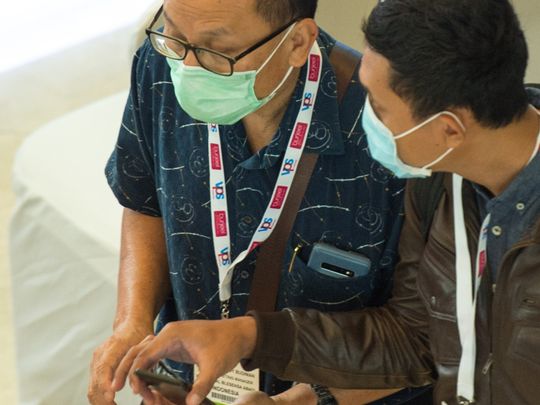
Abu Dhabi: It is now quite common to see people wearing facial masks in the UAE, as residents adopt measures to protect themselves from the novel coronavirus that has affected thousands of people in China and beyond.
While their effectiveness in offering protection is debatable, used masks strewn in public areas can pose a safety hazard. In many cases, the blue and white masks can be found littering sidewalks and alleyways, or carelessly left on tables and washroom surfaces.
“My family and I purchased a box of facial masks last month, but haven’t been using them religiously. A lot of people I encounter on the roads are wearing the masks, and sadly, I’ve seen many a mask thrown on the sidewalk near my apartment building,” a mother-of-two in the capital told Gulf News.
“The littering is unfortunate, and I daresay used masks could spread infections,” she added.
Facial masks, once used, become damp with saliva and fluids, and when removed, they must immediately be placed in waste containers, advised Shafi Mohammad DNP, director of infection prevention and control at Cleveland Clinic Abu Dhabi.
“The best way to dispose of a face mask is to remove it using the bands that hold it on near the ears. People should avoid touching the mask itself, particularly the inside, and place it in a waste container immediately. After doing so, they should make sure to wash their hands properly,” Mohammad said.
Mohammad said that the risk of infections spreading is mainly for people cleaning the streets, if they are not wearing gloves at the time of cleaning. Young children might also be at risk if they pick up a contaminated mask on tables or washroom surfaces.
“The way the infection is understood to be transmitted, you need to be in close proximity in an enclosed environment with an infected person to be at risk. The droplets produced when an infected person coughs or sneezes are not suspended in air for a long time, meaning that in more open areas, a face mask is not generally required. If you’re in a room with someone who is infected, that is the only time that a person would be likely to breathe in infected droplets, making the use of a mask [for the purpose of protection] justifiable,” he explained.
The World Health Organisation (WHO) has recommended hand hygiene as a more effective way than face masks to protect oneself from respiratory viruses.
“Clean your hands with soap and water as often as possible, and especially after any contact with a sick person, or after coughing and sneezing. Alcohol-based hand rubs can also be used,” recommended Dr Adriana Dumitru, critical care specialist at Medcare, Al Safa.








